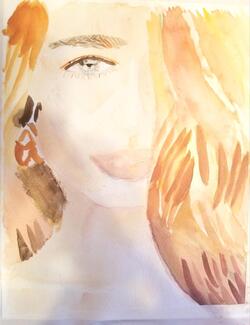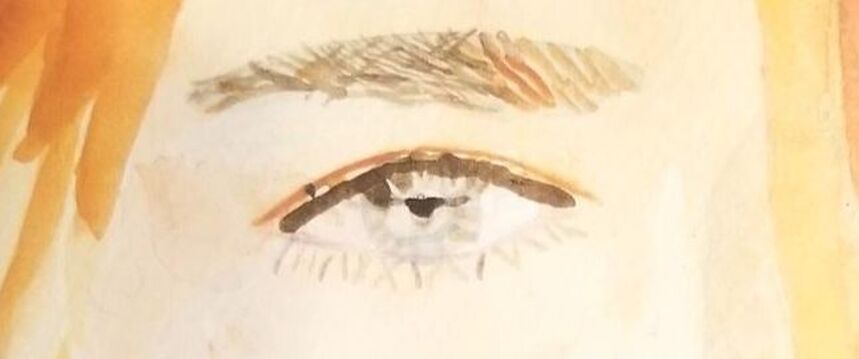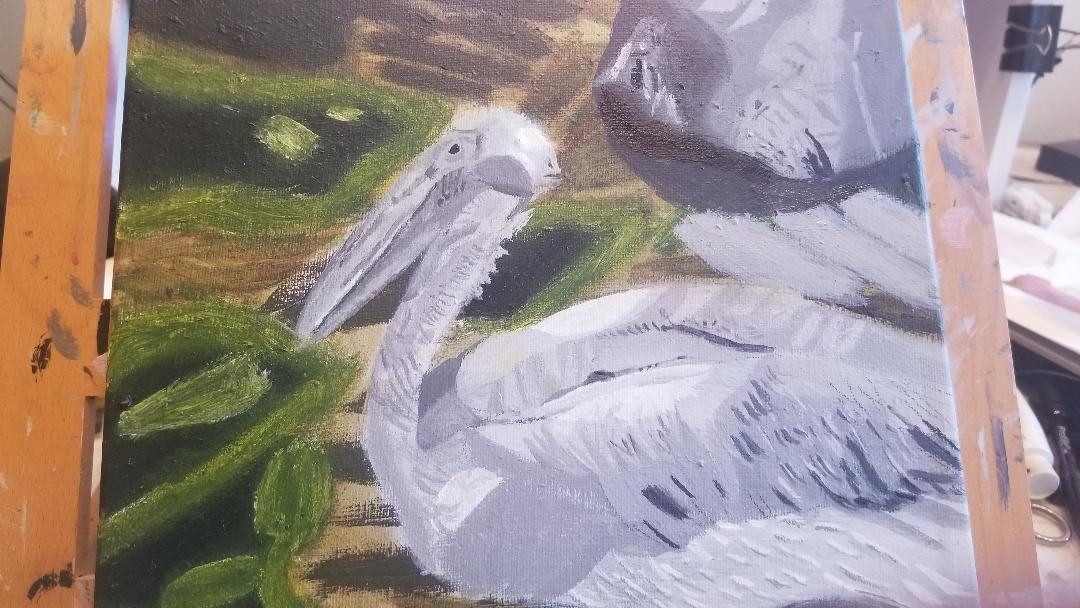|
1. Set the intention to improve If you paint consistently, you'll improve over time, no matter what. But I think you can accelerate the rate at which you improve by actually making the decision to draw or paint something very well by putting extra effort into it. So by, set the intention to improve, I mean, make the decision to put in extra effort.  I want to direct your attention to this painting, particularly the eye on it. When it came time to paint this eye, I could've just decided I was going to fill the iris in one solid color, paint some flicks going out from the lid for lashes, painted a little black dot in the middle for a pupil and called it done. that entire process probably would've taken me less than a minute. But that's not what I did. Instead, I looked intently at the reference photo before I started painting and asked myself what colors and shapes I saw. Where was there white showing? What direction did the hairs in her lashes and brows go in? I made it my goal to replicate all of this in my painting to the best of my ability. I might've spent about five minutes just on this one eye, but it was worth it. I want to remind you that what made this eye one of the best things I've painted, one of the things I'm most proud of really, is something I did before I started painting. I'm really working on getting better about not only looking at the reference photo, because I could glance at a photo and count that as "looking", but to study it before diving into the painting, that's what I'm talking about here. 2. Go into each piece with the mindset that you're capable of more than you think you are. Believe your goals are attainable. Along those same lines, is to believe that you can actually achieve what you want to achieve. Where you are now in your skills is not where you have to stay. As I mentioned in tip one, this will probably mean spending more time on a single part of your piece than you originally thought necessary or might have been willing to spend. I wrote about the topic of patience and how important it is to artists a long time ago. 3. Don't set lofty goals. It's great to be ambitious, but don't tell yourself, I'm going to paint super realistic faces, without breaking it down into smaller, more manageable steps. Otherwise, you'll most likely get discouraged. Instead, put increased effort, like I said in tip one, into a small, but important aspect of achieving this goal, and as your competence increases, add to that overtime. Decide you're going to work on getting accurate proportions, then decide you're going to master shading and blending, etc. Overtime this will lead to you painting more realistic faces, even super realistic ones. This brings me to my next point which is... 4. Practice mindfully and deliberately Of course, there's nothing wrong with zoning out while you're painting and I do it all the time. I even made a post endorsing it, or rather, endorsing painting without judging yourself as you do. But when you're trying to master a new area, you need to be focused and deliberate about that task. For example, I've been taking a portrait drawing class and I decided, I was going to practice getting smoother shading. Everytime I started to shade, I was 100% focused on what I was doing with that pencil. Of course, putting all this mental effort can be tiring, so to take the pressure off... 5. Do this practice as part of a project you're excited about You don't have to do your deliberate practice separate from your incidental practice, ie, projects you do because you want to. Pick a photo, whether one you took yourself, or from a royalty-free site, that you really like, and in recreating it as a painting, use that to work on improving your art skills. 6. Take time off from all of the above Now this might sound like a contradiction of all of the above, but it's not. Constantly being intentional about your work and worrying, for lack of a better word, about improving, will exhaust you and take the joy out of doing art at all. You need those times where you just zone out and paint and don't worry about anything. In fact, I recommend doing any of the other five steps only as much and as often, as you can emotionally handle them. Keep in mind, these are tips for how to improve your art faster, not how to improve your art fast. I also can't give you a timeline of how fast these tips will help you improve because everyone is different. Here's the painting I was working on while writing this post.
0 Comments
|
Sara MillettPainter of portraits and wildlife Archives
November 2023
Categories
All
|

